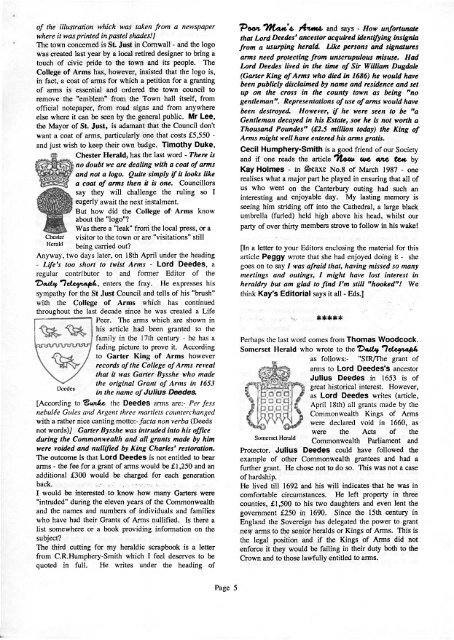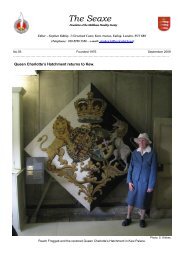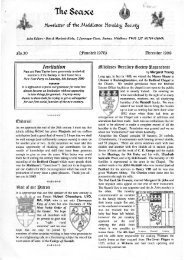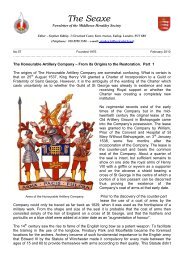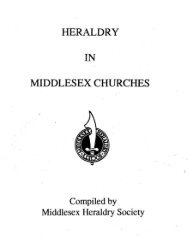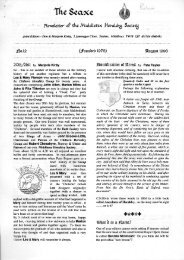The Seaxe - Middlesex Heraldry Society
The Seaxe - Middlesex Heraldry Society
The Seaxe - Middlesex Heraldry Society
Create successful ePaper yourself
Turn your PDF publications into a flip-book with our unique Google optimized e-Paper software.
of the illustration which was taken from a newspaper<br />
where it was printed in pastel shades!]<br />
<strong>The</strong> town concerned is St Just in Cornwall - and the logo<br />
was created last year by a local retired designer to bring a<br />
touch of civic pride to the town and its people. <strong>The</strong><br />
College of Arms has, however, insisted that the logo is,<br />
in fact, a coat of arms for which a petition for a granting<br />
of arms is essential and ordered the town council to<br />
remove the "emblem" from the Town hall itself, from<br />
official notepaper, from road signs and from anywhere<br />
else where it can be seen by the general public. Mr Lee,<br />
the Mayor of St. Just, is adamant that the Council don't<br />
want a coat of arms, particularly one that costs £5,550 -<br />
and just wish to keep their own badge. Timothy Duke,<br />
Chester Herald, has the last word - <strong>The</strong>re is<br />
no doubt we are dealing with a coat of arms<br />
and not a logo. Quite simply if it looks like<br />
a coat of arms then it is one. Councillors<br />
say they will challenge the ruling so I<br />
eagerly await the next instalment.<br />
But how did the College of Arms know<br />
about the "logo"?<br />
Chester<br />
Herald<br />
Was there a "leak" from the local press, or a<br />
visitor to the town or are "visitations" still<br />
being carried out?<br />
Anyway, two days later, on 18th April under the heading<br />
- Life's too short to twist Arms - Lord Deedes, a<br />
regular contributor to and former Editor of the<br />
Daily Telegraph, enters the fray. He expresses his<br />
sympathy for the St Just Council and tells of his "brush"<br />
with the College of Arms which has continued<br />
throughout the last decade since he was created a Life<br />
Peer. <strong>The</strong> arms which are shown in<br />
his article had been granted to the<br />
family in the 17th century - he has a<br />
fading picture to prove it. According<br />
to Garter King of Arms however<br />
records of the College of Arms reveal<br />
that it was Garter Bysshe who made<br />
the original Grant of Arms in 1653<br />
Deedes<br />
in the name of Julius Deedes.<br />
[According to Burke the Deedes arms are:- Per fess<br />
nebulee Gules and Argent three martlets counter changed<br />
with a rather nice canting motto:- facta non verba (Deeds<br />
not words)] Garter Bysshe was intruded into his office<br />
during the Commonwealth and all grants made by him<br />
were voided and nullified by King Charles' restoration.<br />
<strong>The</strong> outcome is that Lord Deedes is not entitled to bear<br />
arms - the fee for a grant of arms would be £1,250 and an<br />
additional £300 would be charged for each generation<br />
back.<br />
I would be interested to know how many Garters were<br />
"intruded" during the eleven years of the Commonwealth<br />
and the names and numbers of individuals and families<br />
who have had their Grants of Arms nullified. Is there a<br />
list somewhere or a book providing information on the<br />
subject?<br />
<strong>The</strong> third cutting for my heraldic scrapbook is a letter<br />
from C.R.Humphery-Smith which I feel deserves to be<br />
quoted in full. He writes under the heading of<br />
Page 5<br />
Poor Man's Arms and says - How unfortunate<br />
that Lord Deedes' ancestor acquired identifying insignia<br />
from a usurping herald. Like persons and signatures<br />
arms need protecting from unscrupulous misuse. Had<br />
Lord Deedes lived in the time of Sir William Dugdale<br />
(Garter King of Arms who died in 1686) he would have<br />
been publicly disclaimed by name and residence and set<br />
up on the cross in the county town as being "no<br />
gentleman". Representations of use of arms would have<br />
been destroyed. However, if he were seen to be "a<br />
Gentleman decayed in his Estate, soe he is not worth a<br />
Thousand Poundes" (£2.5 million today) the King of<br />
Arms might well have entered his arms gratis.<br />
Cecil Humphery-Smith is a good friend of our <strong>Society</strong><br />
and if one reads the article Now we are ten by<br />
Kay Holmes - in <strong>Seaxe</strong> No.8 of March 1987 - one<br />
realises what a major part he played in ensuring that all of<br />
us who went on the Canterbury outing had such an<br />
interesting and enjoyable day. My lasting memory is<br />
seeing him striding off into the Cathedral, a large black<br />
umbrella (furled) held high above his head, whilst our<br />
party of over thirty members strove to follow in his wake!<br />
[In a letter to your Editors enclosing the material for this<br />
article Peggy wrote that she had enjoyed doing it - she<br />
goes on to say 1 was afraid that, having missed so many<br />
meetings and outings, I might have lost interest in<br />
heraldry but am glad to find I'm still "hooked"! We<br />
think Kay's Editorial says it all - Eds.]<br />
Perhaps the last word comes from Thomas Woodcock.<br />
Somerset Herald who wrote to the Daily Telegraph<br />
as follows:- "SIR/<strong>The</strong> grant of<br />
arms to Lord Deedes's ancestor<br />
Julius Deedes in 1653 is of<br />
great historical interest. However,<br />
as Lord Deedes writes (article,<br />
April 18th) all grants made by the<br />
Commonwealth Kings of Arms<br />
were declared void in 1660, as<br />
were the Acts of the<br />
Somerset Herald Commonwealth Parliament and<br />
Protector. Julius Deedes could have followed the<br />
example of other Commonwealth grantees and had a<br />
further grant. He chose not to do so. This was not a case<br />
of hardship.<br />
He lived till 1692 and his will indicates that he was in<br />
comfortable circumstances. He left property in three<br />
counties, £1,500 to his two daughters and even lent the<br />
government £250 in 1690. Since the 15th century in<br />
England the Sovereign has delegated the power to grant<br />
new arms to the senior heralds or Kings of Arms. This is<br />
the legal position and if the Kings of Arms did not<br />
enforce it they would be failing in their duty both to the<br />
Crown and to those lawfully entitled to arms.


